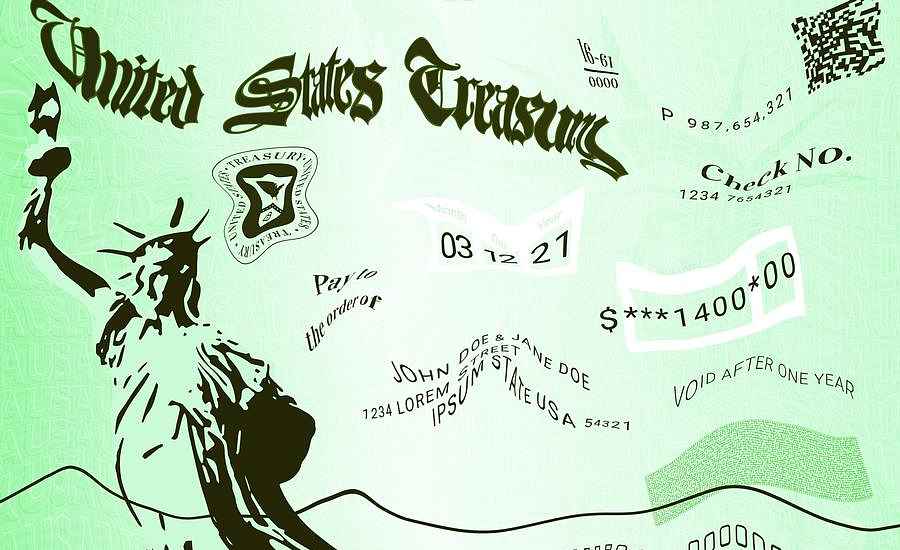






See listing of Recent and Most Popular articles on the Home Page
Finance and Legal
Category: News & Current Events / Topics: COVID-19 • Financial • Fraud • Government • Legal • Money
Stimulus Check Myths, Debunked
Posted: March 19, 2021
Can the IRS take back your $1,400 payment . . . and other myths you may have heard…
Editor's Note: Our third COVID stimulus check hit our bank account this week. As with many things related to money, there are a lot of misconceptions about these payments. What follows is an excerpt of the article in which Julia Glum of money.com describes and debunks seven myths about the latest round of payments. We'll present four here, then you can follow the iink to her original article covering all seven.
President Joe Biden only just approved a third round of coronavirus stimulus checks in the American Rescue Plan, but there’s already a lot of confusion around the $1,400 payments.
Partially because it’s tax time, one of the biggest misconceptions is that the funds will get added to Americans’ tax refunds in the next few weeks. That’s not true. The third Economic Impact Payment (EIP) is an advance on a tax credit for 2021, and the taxes you’re filing this spring — as well as the refund you’re probably getting — are for 2020.
So while it’s possible your coming refund may be larger because you claimed the Recovery Rebate Credit, it’s not related to this new law. Any extra stimulus money you get in your 2020 refund is from the CARES Act and the Consolidated Appropriations Act (which created the first and second stimulus payments last March and December, respectively).
At this point, the $1,400 stimulus check is separate. It will either be direct deposited into your bank account or show up in the mail as a paper check or debit card.
This isn’t the only myth spreading on the internet right now. Here are six other commonly misunderstood aspects of the third stimulus check, along with explanations of what you truly need to know.
Myth: The $1,400 stimulus is based on your 2019 salary.
The facts: The IRS is basing the size of your stimulus check on the information provided in your 2019 tax return — or your 2020 one if you’ve already filed this season. (Reminder: The deadline is April 15.)
The data point it’s using is adjusted gross income, or AGI. AGI isn’t your salary. It’s your wages plus capital gains and such, minus expenses like student loan interest and retirement contributions. If you’re curious, you can use a calculator to determine your AGI.
Myth: People who make over $75,000 don’t get a stimulus check.
The facts: Single filers who earn $75,000 or less and married couples who earn $150,000 or less are eligible for the full amount. Once your AGI exceeds that level, the $1,400 payment begins phasing out — but it doesn’t drop to zero all at once.
The amount you’ll get decreases by 5% for every $100 you earn over the threshold. That means single filers who make $80,000 or more and couples who make $160,000 or more won’t receive a stimulus check.
Myth: Debt collectors can’t take your third stimulus check.
The facts: When the first round of stimulus checks went out last year, many people in debt, on the hook for child support or behind on bank fees worried that their EIPs would be seized to cover them. After some states stepped in to prevent this, the federal government specifically shielded the second, $600 stimulus check from garnishment.
Due to the way the American Rescue Plan was passed, the $1,400 checks don’t have that protection built in. Several consumer groups have demanded Congress rectify this by passing stand-alone legislation, writing in a letter that allowing the payments to be garnished “could impose significant burdens on some families, especially those in communities of color, facing unprecedented circumstances.” But no dice so far.
Continue to read Julia Glum's full article, with the remaining three myths.
Search all articles by Julia Glum
Posted: March 19, 2021 Accessed 1,189 times
![]() Go to the list of most recent Finance and Legal Articles
Go to the list of most recent Finance and Legal Articles
![]() Search Finance and Legal (You can expand the search to the entire site)
Search Finance and Legal (You can expand the search to the entire site)
![]() Go to the list of Most Recent and Most Popular Articles across the site (Home Page)
Go to the list of Most Recent and Most Popular Articles across the site (Home Page)
 Loading requested view...
Loading requested view...